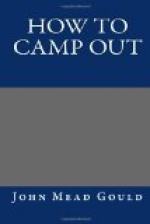STIMULATION.
When cold, fatigued, depressed in mind, and on other occasions, you may feel inclined to resort to artificial stimulus. Respecting this many-sided theme I have a few words to offer—of direct bearing on the collector’s case. It should be clearly understood, in the first place, that a stimulant confers no strength whatever: it simply calls the powers that be into increased action, at their own expense. Seeking real strength in stimulus is as wise as an attempt to lift yourself up by your boot-straps. You may gather yourself to leap the ditch, and you clear it; but no such muscular energy can be sustained: exhaustion speedily renders further expenditure impossible. But now suppose a very powerful mental impression be made, say the circumstance of a succession of ditches in front, and a mad dog behind: if the stimulus of terror be sufficiently strong, you may leap on till you drop senseless. Alcoholic stimulus is a parallel case, and is not seldom pushed to the same extreme. Under its influence you never can tell when you are tired; the expenditure goes on, indeed, with unnatural rapidity, only it is not felt at the time; but the upshot is, you have all the original fatigue to endure and to recover from, plus the fatigue resulting from over-excitation of the system. Taken as a fortification against cold, alcohol is as unsatisfactory as a remedy for fatigue. Insensibility to cold does not imply protection. The fact is, the exposure is greater than before; the circulation and respiration being hurried, the waste is greater; and, as sound fuel cannot be immediately supplied, the temperature of the body is soon lowered. The transient warmth and glow over the system has both cold and depression to endure. There is no use in borrowing from yourself, and fancying you are richer.
Secondly, the value of any stimulus (except in a few exigencies of disease or injury) is in proportion, not to the intensity, but to the equableness and durability, of its effect. This is one reason why tea, coffee, and articles of corresponding qualities, are preferable to alcoholic drinks: they work so smoothly that their effect is often unnoticed, and they “stay by” well. The friction of alcohol is tremendous in comparison. A glass of grog may help a veteran over the fence; but no one, young or old, can shoot all day on whiskey.
I have had so much experience in the use of tobacco as a mild stimulant, that I am probably no impartial judge of its merits. I will simply say, I do not use it in the field, because it indisposes to muscular activity, and favors reflection when observation is required; and because temporary abstinence provokes the morbid appetite, and renders the weed more grateful afterwards.




